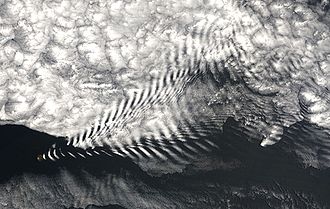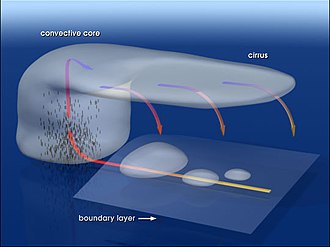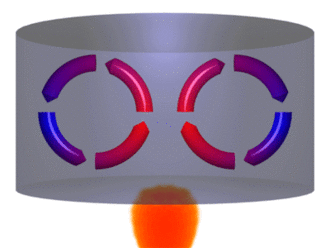Difference between revisions of "AY Honors/Weather/Answer Key/pt-br"
(Created page with "</noinclude>") |
(Created page with "{{clear}}") |
||
| Line 166: | Line 166: | ||
<noinclude></noinclude> | <noinclude></noinclude> | ||
| − | + | {{clear}} | |
| − | |||
| − | |||
<div lang="en" dir="ltr" class="mw-content-ltr"> | <div lang="en" dir="ltr" class="mw-content-ltr"> | ||
Revision as of 14:17, 12 August 2021
Nível de Habilidade
1
Ano
1944
Version
31.12.2025
Autoridade de Aprovação
Conferência Geral
1
1a
1b
1c
1d
1e
1f
1g
2
3
Spirit thermometer
A spirit thermometer and a mercury thermometer work on the same principles. The "spirit" in a spirit thermometer is alcohol, and both alcohol and mercury expand and contract with temperature changes. When it's cold, they contract, and when it's hot, they expand. A thermometer can be built to exploit and amplify these properties. A glass tube with a bulb at the bottom is filled with alcohol. The tube allows for a greater volume of alcohol, so there is more of it to expand. When it expands, the only place it can go is into the narrow tube. The temperature is read based on how high up the tube the expansion sends the alcohol.
4
- a. Por que é mais fresco e úmido nas montanhas, do que nos vales?
- b. De que direção geralmente vem a chuva e o tempo bom em sua região?

Orographic lift occurs when an air mass is forced from a low elevation to a higher elevation as it moves over rising terrain. As the air mass gains altitude it expands and cools. This cooler air cannot hold the moisture as well as warm air and this effectively raises the relative humidity to 100%, creating clouds and frequently precipitation.
5
6
Lightning
Lightning is caused when electrical charges build up in clouds. Scientists are still unsure exactly why that happens, but it is plausible that water droplets and ice travelling up and down within the cloud separate electrons from one another and transport them to the lower portions of the cloud. However this happens, it causes the cloud to have an electric field. When this field becomes strong enough, the electrons in the cloud begin to repel electrons on the ground, causing the ground to have a positive charge. When the voltage difference between the ground and the cloud becomes great enough, the air breaks down and actually conducts electricity. The air actually turns into plasma. When it conducts, the result is a lightning strike. The charge lowers toward earth usually splitting into filaments; these attract an upward plasma charge from objects on the earth such as trees, poles, towers, animals, blades of grass. These filaments are visible to the eye. Many of these charges will travel upwards but usually only one will contact the filaments in the air completing the circuit. Once this happens, lightning strikes with a gigantic release of energy.
7
A rising body of air typically loses heat because it radiates heat. At some point the air becomes denser than the air underneath it, which is still rising. Since it cannot descend through the rising air, it moves to one side. At some distance its downward force overcomes the rising force beneath it and the air begins to descend. As it descends, it warms again through surface contact, conductivity, or compression, and the cycle repeats itself. (The heating through compression of descending air is what is responsible for such welcome winter phenomena as what is known in Western North America as a Chinook wind or in the Alps as a Föhn wind.)
8
Radar
A weather radar is a type of radar used to locate precipitation, calculate its motion, estimate its type (rain, snow, hail, etc.), and forecast its future position and intensity. Modern weather radars are mostly doppler radars, capable of detecting the motion of rain droplets in addition to intensity of the precipitation. Both types of data can be analyzed to determine the structure of storms and their potential to cause severe weather.
9
9a
The jet stream, a narrow band of fast moving wind, generally above 9 km (30,000 feet) has three dimensional regions or pockets of maximum winds along the jet. Where the winds enter these max regions it is appropriately called an entrance region and where it exits, an exit region. As the wind accelerates going into a jet max it produces an area of divergence. This divergence aloft helps generate areas of convergence near the surface. These latter areas are called low pressure centers. And from them we get lots of weather. Besides helping to produce storm centers in the lower atmosphere, the jet stream then helps to steer these storms which are like pieces of wood caught in a fast moving stream of water.
9b
When a volcano erupts, it sends incredible amounts of volcanic ash into the atmosphere. This is enough to decrease the amount of sunlight that reaches the earth, causing a temporary (though sometimes devastating) global cooling. It also affects the intensity of the colors in the sunset for years.
The main effect on weather right near a volcano is that there is often a lot of rain, lightning, and thunder during an eruption. This is because all the ash particles that are thrown up into the atmosphere are good at attracting/collecting water droplets. We don’t quite know exactly how the lightning is caused but it probably involves the particles moving through the air and separating positively and negatively charged particles.
10
The water cycle is the continuous movement of water over, above, and beneath the Earth's surface. It is powered by solar energy, and because it is a cycle, there is no beginning or end. As water moves around in the hydrosphere, it changes state among liquid, vapour, and ice. The time taken for water to move from one place to another varies from seconds to thousands of years, and the amount of water stored in different parts of the hydrosphere ranges up to 1.37 billion km³, which is contained in the oceans. Despite continual movement within the hydrosphere, the total amount of water at any one time remains essentially constant.
11
Wind Vane
A simple wind vane can be made by fastening two sides of a strip of heavy paper around a short section of drinking straw. First, bend the strip in half. Place the straw in the bend and then glue the strip to itself. Drive a dowel, broom stick, or some similar item into the ground where you wish to measure the wind direction, and drive a finish nail into the top end. Then place the straw over the nail so that it may swing freely. When the wind blows, the vane (strip of paper and straw) will swivel on the nail indicating the wind direction.
Rain Gauge
A rain gauge is very simple to make. You will need a small, transparent vessel with constant diameter from top to bottom. If you have difficulty finding a vessel with constant diameter, you may opt to use a two-liter soda bottle. Strip off the label. Cut the top off the bottle, and fill it with plaster to a depth of 4 to 5 cm (this will provide a smooth bottom instead of the knobby bottom with which a two-liter bottle is typically endowed). You may wish to use epoxy instead of plaster - it is more expensive, but is more water proof. Plaster will work fine unless you plan to use the rain gauge for extended periods. You can also improve the water-resistance of the plaster by varnishing it.
Mark the sides of the vessel with a ruler, indicating millimeters and centimeters, with the 0 mark coinciding with the bottom of the vessel's inside. Then set it outside where it can collect rain. When the rain ends, a quick comparison of the water level to the indicators will tell you how much rain fell. Empty the rain gauge between storms.
12
- a. Temperatura
- b. Umidade (orvalho, neblina, chuva, geada ou neve)
- c. Formação de nuvens
- d. Direção do vento
You may need to call your Pathfinders every day to get them to do this. It may help to build the weather instruments from requirement 11 first to build some excitement about weather. It may also help to work on this honor during the season in your area that has the most extreme weather. You can download a tracking chart here and give one to each of your students. http://www.pathfindersonline.org/pdf/resources/weather_tracking_chart.pdf
This requirement is very similar to one found in the Explorer IA curriculum, except that Explorers are required to keep these records for 2 weeks instead of 1 week. Note that the month of record keeping neatly meets this requirement as well as the 3 weeks of record keeping required in the Weather-Advanced honor. Note that the Weather-Advanced Honor requires collecting additional types of data, so if you want to earn the Advanced honor collect all the data required from the beginning of your data collecting efforts and you will cover the basic requirements automatically.
If you forget to take records for a day, do not despair, just get the required number of days in total, even if they span more than a calender week or month.
If you are teaching this honor to a class of Explorers, there is a chart they can fill out in their diaries.




